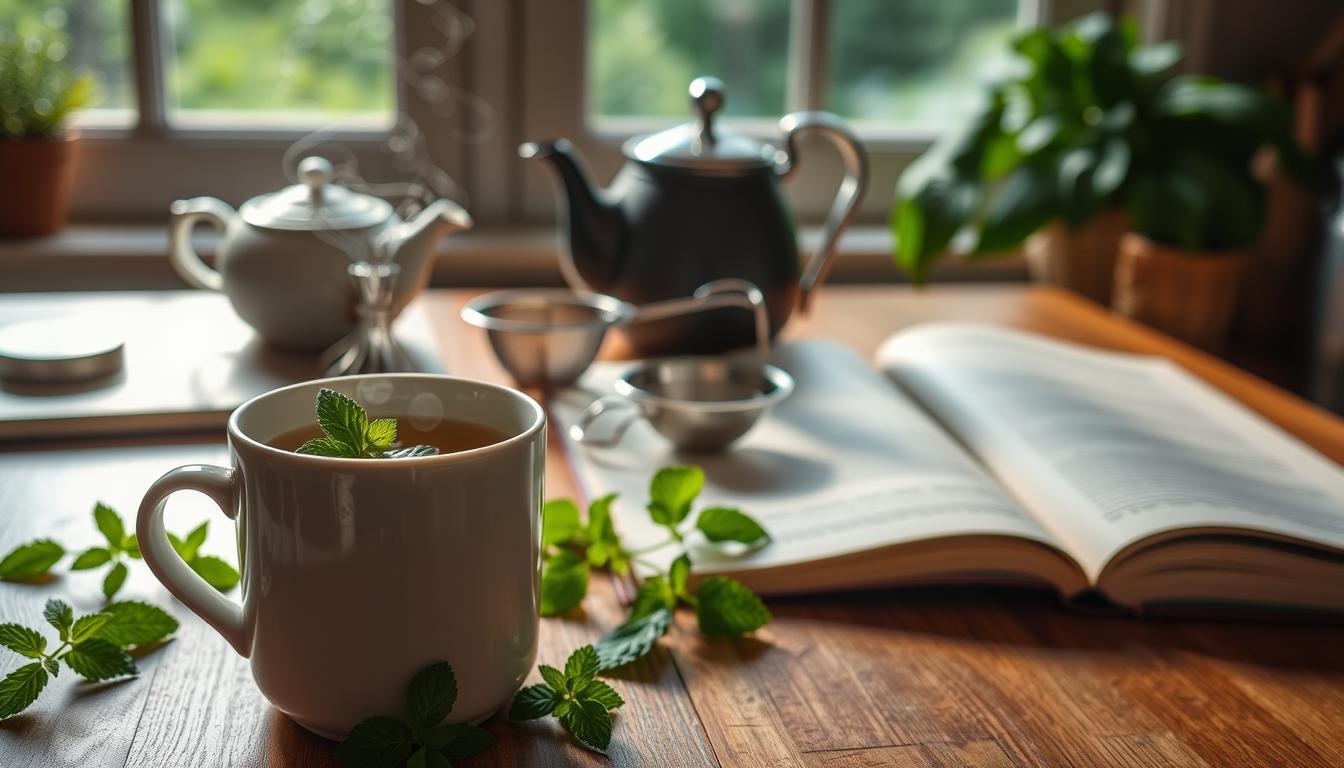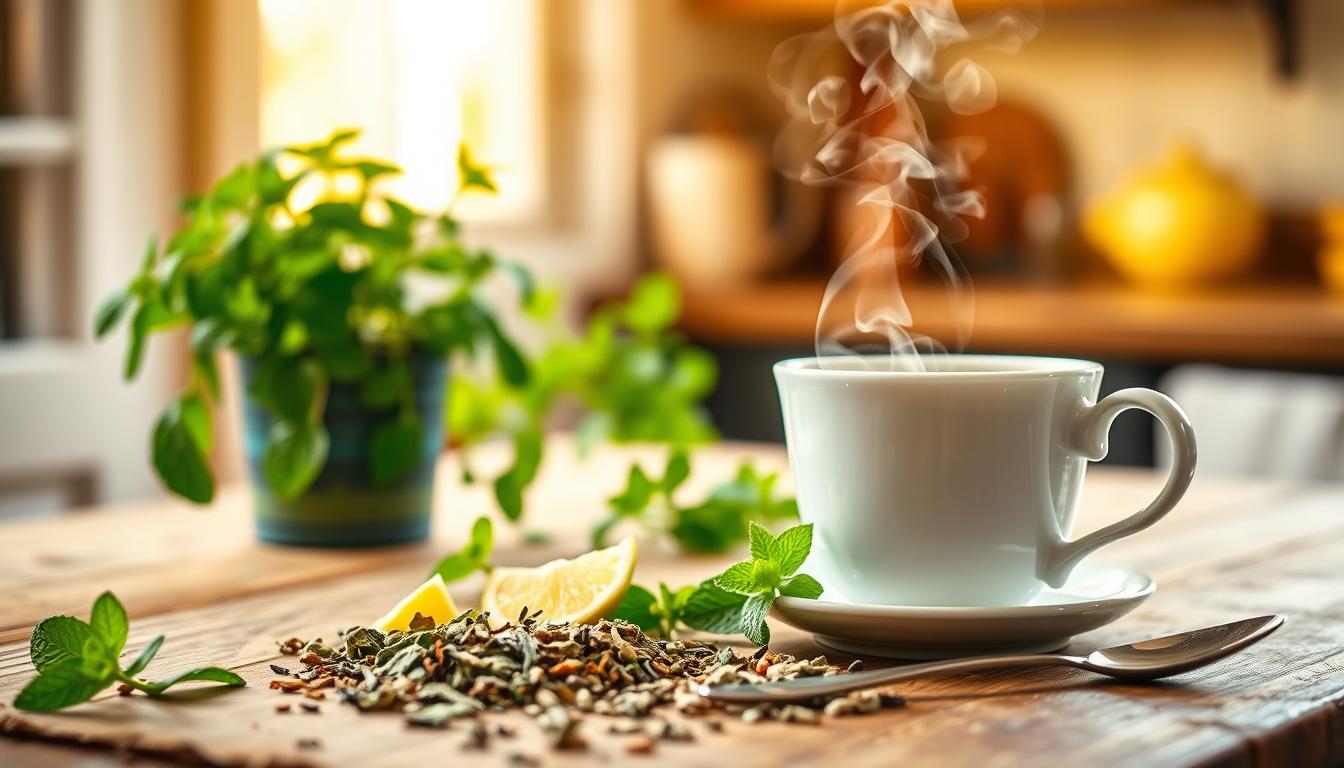Did you know that over 80% of pregnant women in the U.S. seek natural remedies to manage discomfort? One popular choice is peppermint tea, a caffeine-free herbal drink made from the leaves of the peppermint plant. Known for its refreshing flavor and soothing properties, this herb has been used for centuries to ease nausea and promote relaxation.
Recent studies suggest that moderate consumption, about 1-2 cups per day, is generally considered safe for most women. However, conflicting opinions exist regarding its use in the first trimester. Some experts advise caution due to limited research on its effects during this critical period.
Before adding any herbal tea to your routine, it’s essential to consult your healthcare provider. They can offer personalized advice based on your health and pregnancy stage. This article will explore the safety, benefits, and alternatives to help you make informed choices.
Key Takeaways
- Peppermint tea is a caffeine-free herbal drink made from peppermint leaves.
- Moderate consumption (1-2 cups per day) is generally considered safe.
- Caution is advised during the first trimester due to limited research.
- Always consult a healthcare provider before consuming herbal teas.
- Peppermint tea may help ease nausea and promote relaxation.
Understanding Peppermint Tea and Its Uses
The peppermint plant offers a refreshing and natural solution for many. Its leaves are dried and steeped to create a caffeine-free herbal drink. This beverage has been cherished for centuries, both for its flavor and its calming effects.

What is Peppermint Tea?
Peppermint tea comes from the leaves of the peppermint plant, native to Europe and Asia. Unlike conventional teas, it contains no caffeine, making it a popular choice for those seeking a soothing drink. Its refreshing taste and aroma make it a favorite among herbal tea enthusiasts.
Traditional and Modern Uses in Pregnancy
Historically, peppermint tea has been used to ease upset stomachs and nausea. Today, many women find it helpful for managing pregnancy-related discomforts like cramps and morning sickness. Modern studies and anecdotal evidence support its benefits as a safe, non-caffeinated option.
Here’s a quick comparison of conventional and herbal teas:
| Type | Caffeine Content | Common Uses |
|---|---|---|
| Conventional Tea | Yes | Energy boost, flavor |
| Herbal Tea (e.g., Peppermint) | No | Relaxation, nausea relief |
Peppermint tea’s pleasant taste and calming effects make it a versatile choice. Whether enjoyed hot or cold, it provides a moment of tranquility. Stay tuned as we explore research findings and expert recommendations in the next section.
is peppermint tea safe during pregnancy
Many women turn to natural remedies for comfort while expecting. Herbal drinks, like peppermint tea, are often chosen for their soothing properties. But what does the research say about their safety?
Research Insights and Scientific Studies
Recent studies provide valuable insights into the effects of herbal drinks during this special time. A 2017 review highlighted that moderate consumption is generally considered safe. However, excessive amounts, especially in the first trimester, may pose risks.
Clinical trials have shown that the active ingredient in peppermint leaves can help ease nausea and vomiting. These findings are supported by anecdotal evidence from many women who have found relief through this natural option.
“Moderation is key when it comes to herbal drinks during pregnancy. Always consult your healthcare provider for personalized advice.”

Expert Recommendations and Safe Consumption
Experts typically recommend limiting intake to 1-2 cups per day. This amount is considered safe and unlikely to cause adverse effects. However, further research is needed to establish definitive guidelines.
Here’s a quick comparison of herbal and caffeinated drinks:
| Type | Caffeine Content | Common Uses |
|---|---|---|
| Herbal Tea | No | Relaxation, nausea relief |
| Caffeinated Tea | Yes | Energy boost, flavor |
While herbal options are generally safer, it’s essential to balance consumption with professional advice. Stay informed and make choices that support your health and well-being.
Exploring Herbal Tea Alternatives During Pregnancy
Herbal drinks have long been a go-to for natural relief, especially for expecting mothers. While peppermint tea is a popular choice, other options like ginger and chamomile also offer unique benefits. Understanding these alternatives can help you make informed decisions for your health.
Comparing Herbal Options: Ginger, Chamomile, and More
Ginger tea is well-known for its ability to ease nausea, a common discomfort in the first trimester. Its active ingredient, gingerol, has been studied for its anti-inflammatory properties. Many women find it helpful for managing morning sickness.
Chamomile tea, on the other hand, is praised for its calming effects. It can promote relaxation and improve sleep quality. However, some experts recommend limiting intake due to its potential to stimulate uterine activity.
Raspberry leaf tea is another option often suggested in the third trimester. It’s believed to support uterine health and prepare the body for labor. Always consult your healthcare provider before trying new herbal drinks.
Understanding Caffeine Versus Caffeine-Free Choices
Herbal teas like peppermint, ginger, and chamomile are naturally caffeine-free. This makes them a safer choice compared to caffeinated drinks, which can affect sleep and hydration levels. Moderation is key, even with caffeine-free options.
Here’s a quick comparison of popular herbal drinks:
| Type | Benefits | Considerations |
|---|---|---|
| Ginger Tea | Eases nausea, anti-inflammatory | Limit in large amounts |
| Chamomile Tea | Promotes relaxation, improves sleep | May stimulate uterine activity |
| Raspberry Leaf Tea | Supports uterine health | Best in third trimester |
Choosing the right herbal drink can support your health and well-being. Always consult your healthcare provider for personalized advice.
Safety Considerations Throughout Each Trimester
Understanding the unique needs of each trimester can help expecting mothers make informed choices about herbal drinks. Pregnancy is divided into three distinct phases, each with its own sensitivities and requirements. Tailoring your approach to herbal consumption ensures both maternal and fetal well-being.
First Trimester: What to Watch For
The first trimester is a critical period for fetal development. During this time, some herbal drinks, including peppermint, may pose risks. Research suggests that large amounts could stimulate menstruation, which might lead to complications.
Experts recommend avoiding excessive consumption in the early stages. Instead, focus on milder options like ginger, which can help ease nausea without potential risks. Always consult your healthcare provider before introducing new herbs into your routine.
Guidelines for Second and Third Trimesters
As pregnancy progresses, the risks associated with herbal drinks decrease. Moderate consumption of peppermint tea, around 1-2 cups per day, is generally considered safe. This amount provides soothing benefits without overloading the system.
Other options like chamomile and raspberry leaf tea can also be beneficial. Chamomile promotes relaxation, while raspberry leaf supports uterine health in the later stages. Monitor your body’s response and adjust intake as needed.
| Trimester | Guidelines | Recommended Herbs |
|---|---|---|
| First | Avoid large amounts; consult a provider | Ginger |
| Second | Moderate consumption (1-2 cups/day) | Peppermint, Chamomile |
| Third | Focus on uterine health | Raspberry Leaf |
By following these guidelines, you can enjoy the benefits of herbal drinks while minimizing risks. Always prioritize open communication with your healthcare provider to ensure the best outcomes for you and your baby.
Peppermint Tea and Breastfeeding Insights
Breastfeeding mothers often seek natural remedies to support their postpartum journey. Herbal drinks, like peppermint tea, are a popular choice for their soothing effects. While research on this topic is limited, anecdotal evidence suggests it can be beneficial when used in moderation.
Breastfeeding and Herbal Tea Use
Some studies indicate that menthol from peppermint can pass into breast milk. However, no adverse effects on milk supply or infant behavior have been confirmed. Many women use this herb to alleviate postpartum discomfort, such as engorgement or mild digestive issues.
Experts recommend limiting intake to 1-2 cups per day. This amount is unlikely to cause harm and may provide relief. Always monitor your baby for any unusual reactions, such as fussiness or changes in feeding patterns.
“Moderation and careful observation are key when using herbal drinks while breastfeeding.”
Weaning and Postpartum Considerations
Peppermint tea is sometimes used to ease the weaning process. Its calming properties can help reduce discomfort during this transition. However, evidence remains mostly anecdotal, and further research is needed to confirm its effectiveness.
For postpartum care, consider other herbal options like ginger or chamomile. These alternatives offer unique benefits, such as nausea relief or improved sleep quality. Always consult your healthcare provider before making changes to your routine.
Here are some practical tips for breastfeeding mothers:
- Stick to moderate amounts of herbal drinks.
- Monitor your baby for any changes in behavior.
- Consult a healthcare professional for personalized advice.
- Explore other herbal options if needed.
By staying informed and cautious, you can enjoy the benefits of herbal drinks while ensuring the well-being of both you and your baby.
Conclusion
Choosing the right herbal drink can make a difference in your pregnancy journey. Moderation is key—most studies suggest 1-2 cups per day of peppermint tea is generally considered safe. However, caution is advised in the first trimester and while breastfeeding.
Scientific research supports the benefits of herbal options like ginger and chamomile. These caffeine-free choices can ease nausea and promote relaxation. Always distinguish between herbal and caffeinated drinks to avoid unnecessary risks.
Each trimester has unique needs. For example, ginger is often recommended early on, while raspberry leaf may be beneficial later. Breastfeeding women should monitor their intake and consult a healthcare provider for personalized advice.
In summary, herbal teas like peppermint can be a safe and beneficial option when consumed responsibly. Stay informed, prioritize moderation, and always seek professional guidance for the best outcomes.
